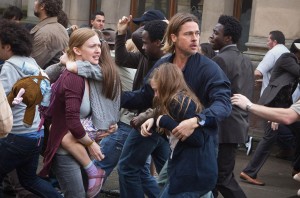I’ve been very distracted over the last month, and while I’ve been turning in my reviews and they’ve been getting published, I’ve been spacing on linking to them. So, here are the four that I haven’t told y’all about, in order of most recent release.

50/50: I think one of the weirder genres of film is the disease comedy. Even if the film itself is an organic melding of comedy and tragedy, the idea itself is jarring. Paul Rudnick’s Jeffrey is a damn good movie (though a much better play), but it’s a sex comedy about AIDS. I mean, really. The Big C is a sitcom starring a host of wonderfully funny actors – Laura Linney, Oliver Platt, John Benjamin Hickey, Cynthia Nixon – but it’s about a woman with terminal cancer. Ugh. In the newest of the genre, 50/50, Adam (Joseph Gordon-Levitt) responds to the stunned silence that follows the announcement of his diagnosis by asking, “Have you seen Terms of Endearment?” referencing the mother of all cancer comedies. How meta. And since it’s meant to get a laugh, it’s even more self-referential. [Read the whole thing.]

Moneyball: Michael Lewis’ 2003 book about how the Oakland Athletics’ general manager Billy Beane used baseball statistics in complex, innovative and surprisingly winning ways was a phenomenal bestseller. Moneyball: The Art of Winning an Unfair Game has remained hugely popular for years, not just because Lewis managed to write a good sports drama but also because he wrote a great business book about how a macho, intuitive industry was changed by analytic nerds. While sports metaphors work well in business, and sports movies can be great drama, business books don’t make great films. However, the film based on Moneyball is a great movie, and this despite the business drama behind it, with the second director Steven Soderbergh getting fired and an Aaron Sorkin script getting rewritten. But Brad Pitt (playing Beane), Bennett Miller (who directed Capote), and Steve Zaillian (who adapted Schindler’s List), have hit a home run. (Sorry.) [Read the whole thing. Bonus: There’s a capsule review of Drive at the end.]

Contagion: I guess if you really want to scare the Bejesus out of audiences, releasing a movie about a mysterious, end-of-the-world viral pandemic on the weekend of the 10th anniversary of the Sept. 11 attacks is one sure-fire way.
Unlike traditional horror movies that revolve around supernatural evil (The Exorcist) or angry psychopaths (Friday the 13th) or science fiction (28 Days Later), Contagion earns its horror by telling a story as close to possible as Traffic or The Hurt Locker did and then lets the underlying nervous terror wrought by the weekend amplify the fear. It’s a cynical, manipulative and exploitative move, and I’m not sure how commercially successful such a movie can be.
However, if you have Steven Soderbergh directing Matt Damon, Kate Winslet, Jude Law, Marion Cotillard and Laurence Fishburne, you can probably get funding for a movie about alfalfa farmers; you can get a lot of funding if you say your movie is Outbreak crossed with Traffic. It would help, of course, if the movie was as good as Traffic, Steven Soderbergh’s problematic masterpiece. Alas, it’s not. [Read the whole thing.]

Warrior: I must admit that going into the theater to see the mixed martial arts movie Warrior, I thought it was based on a true story. I don’t know why I thought this. It may have been its gritty similarity to The Fighter, last-year’s Oscar-winning movie about the real-life boxer Micky Ward and his brother Dicky. Or maybe it was that the last time Tom Hardy, the break-out star of last year’s Inception, was bulked up this huge, he was in Bronson, the mostly true story about an infamous British criminal.
Whatever the reason was, I think that believing that the brothers Brendan and Tommy Conlon were real people helped me to fall for the film in ways that were quite unexpected for me. Because I must also admit that the reason I was initially so excited to see Warrior is that I knew it would feature a lot of shirtless muscle gods wailing on each other. [Read the whole thing.]
 People are scared that the end is coming. I don’t think they actually believe that Judgment Day is nigh, or that an extinction-level asteroid is on its way, or that Syria (or North Korea, or Taiwan) is going to lead to World War 3, or that a virus will mutate into a pandemic as deadly as the Spanish flu or whatever it was that nearly ended human civilization in Contagion, 28 Days Later, or The Walking Dead. But all of these things are making people anxious – very, very anxious – and somehow this is translating into a desire to buy tickets to movies about what these people are anxious about. They actually make me more anxious than I was already, but it seems that for some people these movies calm them down, sort of like how speed calms down kids with ADHD.
People are scared that the end is coming. I don’t think they actually believe that Judgment Day is nigh, or that an extinction-level asteroid is on its way, or that Syria (or North Korea, or Taiwan) is going to lead to World War 3, or that a virus will mutate into a pandemic as deadly as the Spanish flu or whatever it was that nearly ended human civilization in Contagion, 28 Days Later, or The Walking Dead. But all of these things are making people anxious – very, very anxious – and somehow this is translating into a desire to buy tickets to movies about what these people are anxious about. They actually make me more anxious than I was already, but it seems that for some people these movies calm them down, sort of like how speed calms down kids with ADHD.


